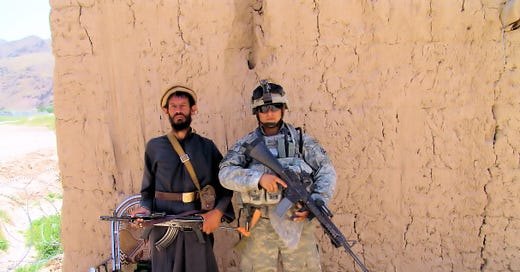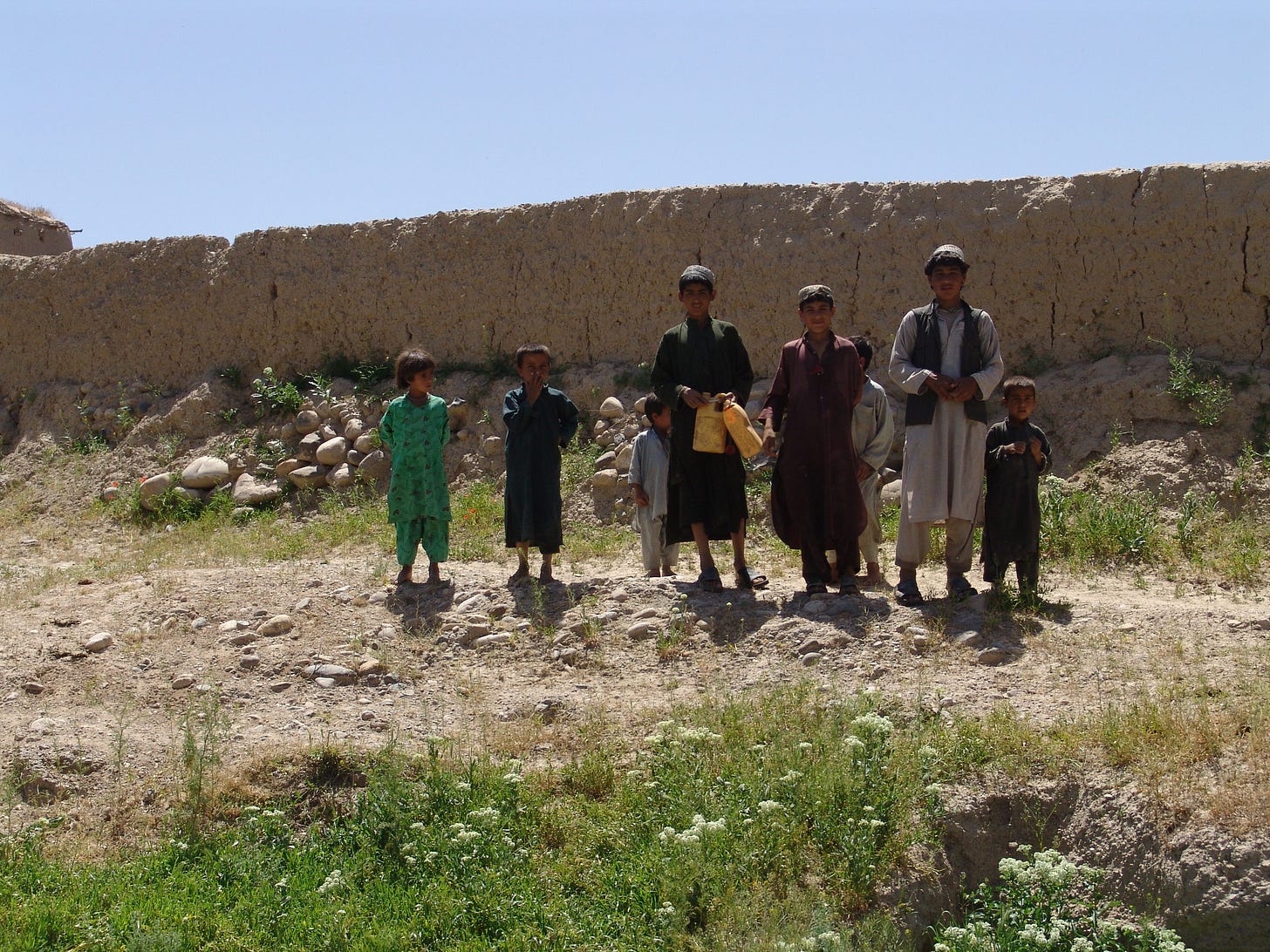By Michael Fumento
With the Taliban close to conquering all of Afghanistan for the first time, the world is haunted by pictures of desperate Afghans falling to their deaths from transport planes in their desperate efforts to escape the bearded oppressors. I’m haunted by the blowups on my wall from my embed there in 2008.
Among them is one of an American GI in his digital uniform standing next to a grizzled Afghan whose headgear indicates he fought under Ahmad Shah Massoud, the Lion of Panjshir, who battled first the Soviet invaders, then the communist puppet government, and then the Taliban and their al Qaeda guests until al Qaeda assassinated Massoud two days before the 9/11 attacks. The Afghan proudly wore a Soviet belt buckle he had removed from an enemy.
There’s also one of eight children standing in front of a mud wall. The boys will grow up under one of the world’s harshest Muslim regimes and be pressed into military service to force the same upon others. The girls now have no hope to ever do anything besides cook and make little Taliban babies. They may not have to wear burqas outside the home because it’s actually common to keep women imprisoned within their mud walls from marriage till death.
It didn’t have to be this way. Just a few months ago only 90 out of 398 districts were under firm Taliban rule, mostly where people actually hold Taliban beliefs. It all changed when President Joseph Biden decided it was time to end “America’s longest war” and stop losing more American servicemen, devil be damned. But with the devil in control, suddenly that doesn’t seem like such a good idea anymore.
Total US deaths in Afghanistan over the two-decade period have been 2,218 with 1,183 KIA, vastly fewer than the 2,400 American KIA on Omaha Beach alone from a national population less than half of today’s. (You don’t even want to hear about Civil War one-day casualties.) More importantly, there have been no American combat deaths in Afghanistan since February of last year despite Biden’s claim on Monday that “Americans are dying” there. It was a hell of a lot more dangerous driving for Uber in Chicago. No American draftees have died in Afghanistan. And as a former combat soldier, I can tell you that countless warriors would have given their back teeth and a few front ones to have had the chance to see action in Afghanistan and get the coveted Combat Infantry Badge or Combat Action Badge. We trained to fight.
When the pullout began, only an estimated 2,500-3,500 American soldiers were even there. Given American commitments in about 800 locations in more than 70 countries and territories around the world, that’s about the equivalent of a waterline rise by throwing a brick into an Olympic-sized pool.
A better comparison than war was Britain’s commitment in Northern Ireland during what’s called “The Troubles.” Rather than abandon the people to anarchy, violence, and death, the Brits kept troops there and took casualties until finally signing a peace accord in 1998.
Korea embarrasses the alleged foreign policy expert in two ways. First, about 28,000 US servicemen are still based in South Korea, 68 years after major hostilities ended. With only an armistice, we have technically been in a state of war with both China and North Korea since 1950. Let’s see, 68-20 equals … Oh, and yes, American soldiers have been killed in there since 1953.
But while the British nobly protected the Irish and we nobly protect South Korea (granted, it’s hard to imagine a world without their electronics), in Afghanistan, yes, we were protecting them, but also ourselves. There have been no terrorist attacks launched on the US from Afghan soil since we and our NATO partners went in. We were getting a tangible reward for minimal effort.
Biden contended he was locked into a February Doha 2020 accord, yet his own State Department said that the conquests and the beheadings—and all that—put the Taliban in violation of “the letter and the spirit” of the agreement. Translation: Null and void.
But doesn’t the cut and run performance of the Afghan Armed Forces and police show that despite 20 years of training they were still a piss-poor force that would have eventually collapsed?
Not at all. At least two reasons.
First, obviously it wasn’t 2,500-3,500 Americans (plus some NATO allied troops) keeping the Taliban at bay—especially when they weren’t taking casualties. Instead, the sudden withdrawal popped our allies’ morale like a balloon. And morale has been a vital part of warfare since the first rock was hurled in anger.
“An army’s effectiveness depends on its size, effectiveness, training and morale and morale is more important than any of the other factors combined,” said Napoleon. “Morale is the single greatest factor in modern wars,” said Eisenhower. Our Afghan allies just needed to know we were there, in the same country, not abandoning them like we did the Syrian Kurds two years ago. But in fact, abandon them is exactly what we did, even leaving some of those who risked the most, like interpreters, to have their heads lopped off.
I hope it’s not an affront to American exceptionalists to note we had little or no hope of winning the Revolution without French aid (long before the official 1778 treaty) that also served as moral support, nor that we could not have won at Yorktown without French ships. Or possibly without the help of a single foreign “advisor,” the Prussian Baron von Steuben.
The second part is that American military doctrine since Vietnam has relied on utterly overwhelming air support, both fixed-wing and helicopter. The only reason the Marine base at Khe Sanh in 1968-69 didn’t become another Dien Bien Phu was continual air resupply and massive B-52 strikes. Indeed, on numerous occasions U.S. Afghanistan bases would have been overrun but for wave after wave of helicopter gunships, A10 and AC-130 attack aircraft, and strategic bombers. One base camp I was at had just enough medium weaponry to hold off an assault until air support could arrive, a single 120 millimeter mortar, and the weapons mounted on three Humvees. Have we forgotten that the initial spectacular allied successes in the war were waged by Special Forces soldiers on horseback calling in strategic bomber strikes?
But we left the Afghan military relying on a small motley air force, without a single bomber. What did we expect? Senate Minority Leader Mitch McConnell, R-Ky., pressed Biden for airstrikes but they appear to have been few and far between, mostly aimed at destroying US equipment to keep it out of Taliban hands. (And mostly failing even that. They’ll be using our weaponry for decades.)
In other words, we were asking the Afghan military to do something we couldn’t do.
It’s also not the first time we pulled the rug like this. In Spring 1972, the North Vietnamese launched a massive armored attack on South Vietnam that their small air force couldn’t possibly hold back. Nixon launched a colossal air assault, Operation Linebacker, that combined with fierce South Vietnamese resistance blunted the campaign. Three years later, with Nixon gone, North Vietnam tried again and Congress completely denied air support. All American advisors had also been withdrawn. Between lack of air power and knowing they had been abandoned, the South Vietnamese Army was quickly routed.
With 50 years of technological advances, the US could readily have blunted the Taliban attack even weeks ago, with a vast array of strategic bombers and tactical fighters. (Hint: One B1B Lancer can drop bombs on 84 separate targets flying from an Arabian base and return without refueling.) In fact, when it was clear a rout was in the making, Biden could have done what his boss did. In 2014, faced with circumstances his advisors hadn’t predicted, President Obama sent 1,400 new troops to Iraq to stabilize the situation, bringing the total number up to about how many we had in Afghanistan prior to Biden’s withdrawal.
No need! The “likelihood there’s going to be the Taliban overrunning everything and owning the whole country is highly unlikely,” Biden said on July 8. That’s the same day I published an article saying the entire country was in danger of being overrun.
Now, as the London Observer put it, “The withdrawal has set Afghanistan back on the path to terror, mayhem and disintegration … A catastrophe is in the making.” Yes. We have left Afghans worse off than twenty years ago when at least a northern portion was Taliban-free. The Taliban who used to hate us for no reason now have a reason. We killed an awful lot of them.
Then there’s al Qaeda. Remember them? They’re no longer too busy looking over their shoulders to launch attacks but rather have “the opportunity to rebuild its network, to the point where it could once again plot attacks around the world,” Dr Sajjan Gohel, a security and terrorism analyst, told the BBC. And even when it was hoped the Taliban wouldn’t seize the entire country, CIA Director William Burns declared that mere withdrawal means “the US government’s ability to collect and act on threats will diminish … That is simply a fact.”
Anyone who thinks drones can substitute for human intelligence watches too much Netflix and likewise, UAVs aren’t particularly good at conducting raids like the one that took out Bin Laden. That assault was launched from an air base quite close to the target. Now those same helicopters would have to cross vastly more territory giving the enemy that much more time to detect them and blast them.
All this to give Biden bragging rights to end “America’s longest war”—except for the actual longest one in Korea. This tragedy is a “damned spot” that the world will be trying to wash out long after Biden is gone.
Michael Fumento (www.fumento.com) is an author, attorney, journalist, and former airborne sergeant who embedded thrice in Iraq and once in Afghanistan.






Can Biden's political career survive this? Does this kill his chance at re-election? When even NPR is critical you know it's bad.
The more I brood over this self-inflicted defeat, the angrier I feel. What is going through my mind was well expressed by Winston Churchill's speech in the House of Commons on October 5, 1938, after the signing of the Munich Agreement:
“I will, therefore, begin by saying the most unpopular and most unwelcome thing. I will begin by saying what everybody would like to ignore or forget but which must nevertheless be stated, namely, that we have sustained a total and unmitigated defeat…
“And do not suppose that this is the end. This is only the beginning of the reckoning. This is only the first sip, the first foretaste of a bitter cup which will be proffered to us year by year unless by a supreme recovery of moral health and martial vigour, we arise again and take our stand for freedom as in the olden time.”
These words strike like an arrow at the gnarled little heart of the Biden Administration. The damage he and his minions have done, the shame they've brought upon the United States, the aid and comfort they've given to our enemies, the hell to which they've condemned the people of a prostrate nation, will reverberate down the years and decades. As Churchill said of Munich, this week's humiliating spectacle is but a foretaste of a terrible reckoning. And worst of all, for the next three years the leaders, so called, who engineered this cowardly defeat and surrender will remain in charge. As long as Joe Biden occupies the White House, the urgently necessary "recovery of moral health and martial vigour" is scarcely to be expected.